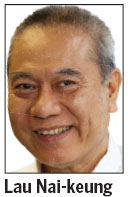No more missing out on Qianhai
Updated: 2013-02-05 06:32
By Lau Nai-Keung(HK Edition)
|
|||||||

During December, Xi Jinping visited Shenzhen for his first inspection trip as the Communist Party of China's new General Secretary. According to political observers, Xi's trip was a tribute to the famous southern tour of Deng Xiaoping in 1992 and signaled his commitment to deepening reform. These commentators begged critically important questions: what is the direction of the country's reform how would the reform affect Hong Kong, and what can we do in view of the changes ahead of us?
It is quite interesting that Qianhai, Hengqin and Nansha, which Xi Jinping visited during his trip to Shenzhen, are all government-designated development zones and new platforms for cooperation across the Guangdong-Hong Kong-Macao region. This may very well be a clear signal that, when Xi said reform and opening must involve breaking new grounds, he meant some systems and practices in Hong Kong and Macao would provide an important strategic direction for nationwide reform and opening up in the coming years.
Since 2010, the Shenzhen government has aspired to turn Qianhai into "Manhattan of the Pearl River Delta", with a target GDP of 150 billion yuan (HK$187 billion) by 2020 for the zone. In other words, this 15 square kilometer special zone in west Shenzhen will have one tenth of Hong Kong's 2011 GDP (HK$1,823 billion) at the end of the target period. Should we be concerned?
After years of sluggish progress, recent developments indicate that Qianhai has passed through the conceptual stage. Last July, 37 financial firms including HSBC signed non-binding agreements to pour investments worth more than 300 billion yuan into Qianhai.
After Xi's visit, the central bank's Shenzhen branch announced provisional regulations allowing firms registered in Qianhai to take out loans in yuan from Hong Kong banks. By the end of January this year, banks in Hong Kong were granted permission to offer a combined total of 2 billion yuan in loans to companies in Qianhai.
It is generally believed that Qianhai is one of Xi's babies. As development speeds up following Xi's rise to power, shares of firms with a Qianhai theme could potentially rise considerably. However, our government's inactions may prevent both Qianhai and Hong Kong from maximizing the synergy of cooperation.
In his writings and speeches both before and after he became Chief Executive of the city, CY Leung often focuses on "domestic relations" between Hong Kong and the mainland with emphasis on increasing cross-border exchanges with provinces and municipalities for mutual benefit. However, "domestic relations" also seem to be the area where the government can fare better when it comes to Qianhai.
Previously, there was a chance for Hong Kong to lead Qianhai cooperations and to decide how the two cities might cooperate to get the most out of pending financial reform. Leung's predecessor missed that chance and Qianhai proceeded with little input from Hong Kong. Now Qianhai's strategic path forward is mostly laid out, and Hong Kong can no longer dominate the relationship. But a lot of detailed arrangements still remain fluid. CY Leung should have done more in the past six months to mitigate his predecessor's damage, and now we see the clock ticking as Qianhai's regulatory framework crystallizes.
Luckily our entrepreneurs are more proactive. A couple of weeks ago, the Hong Kong Securities Professionals Association signed an agreement with Qianhai's authorities for the two sides to work out proposals attracting Hong Kong and international financial firms to invest in Qianhai. If the arrangements go smoothly, this will be beneficial to Hong Kong both in terms of economic growth and employment.
However, risks to Hong Kong, Qianhai and Big Business remain if the government remains passive. Without action, populist pressure could force Hong Kong to employ the time-proven crybaby tactic again in Beijing, to stop Qianhai from having an upper hand.
The author is a member of the Commission on Strategic Development.
(HK Edition 02/05/2013 page1)